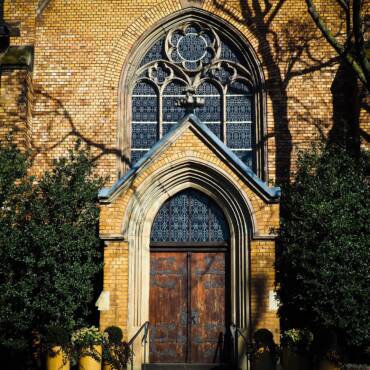Hanukkah and the Mercies of God

By Sam Nadler
Hanukkah, also known as the Feast of Dedication, is an eight day feast beginning on the 24th of Kislev which, this year falls at sundown, December 22nd.
The first Hanukkah was established in 164 BC as a memorial to the purification and rededication of the Temple in Jerusalem. This cleansing was necessary due to its defilement three years earlier. In 167 BC Antiochus Epiphanes, the king of Syria, captured, Jerusalem, plundered the Temple treasury and to add insult to injury, profaned the Temple by sacrificing a pig to Zeus on the Temple altar. His persecution of and attempt to Hellenize the Jewish people in Judea resulted in what is called the Maccabean revolt led by Judah Maccabee, the Israelis resisted and fought against the occupying Syrian army and after three years, defeated them, rededicating the Temple back to God. Today, as His living temples, this Hanukkah season gives an opportunity to reflect on our own dedication. Unless we are dedicated to Him, we are not spiritually useful to God and we, therefore, live unfulfilled lives.
Empowered by Mercy
In Romans 12:1 we read: “Therefore, I urge you, brethren, by the mercies of God, to present your bodies a living and holy sacrifice, acceptable to God, which is your spiritual service of worship.”
“The mercies of God” refers to what God has done for us in Messiah. Mercies, or compassion, has two aspects, manifested mercy (Romans 11:31), and motivating mercy (Romans 12:1). In other words, God has shown us His mercies in the past, however, we still rely on His mercies every day. The mercies are the very conduit, the empowerment that enables us to do God’s will.
While all manner of service for God is within the scope of this verse, Paul bases the first verse of Romans 12 on his previous thought: “even so these (Jewish people) also have now been disobedient, that by the mercy shown to you (Gentiles) they may also obtain mercy” (Romans 11:30, 31). Here Paul tells us that Gentile believers are to show mercy to unsaved Jewish people. Thus, in context, we see the obvious thrust for all believers to serve sacrificially by bringing the Good News to the Jewish people, and thereby make Israel jealous for their Messiah (Romans 11:11).
Put it on the Altar
Next, Paul tells us to present our bodies in grateful willingness as a living sacrifice to God. This involves our entire being. Think of what area or areas you may be hesitant to present to God: pride, fear, lust, ambition, personal time, etc. Left unchecked, these areas become strongholds of defiance and places of corruption. Because we’ve been bought with a price, we present our lives for His use only:we are not our own, anymore. We serve at His discretion, not by our preferences.
A Living Sacrifice
By the mercies of God, we are a living sacrifice. Paul isn’t speaking about salvation, because Yeshua accomplished that for us and no other sacrifice can be made that will expiate sins (Hebrews 10:12). We’re made alive in Yeshua for service unto God (Romans 6:4), which is the fulfillment of our lives.
Some declare they are willing to die for Yeshua, but the real question is, “are we willing to live for Him?” It’s not your last drop of blood, but your first drop of sweat that can make a difference. So, let us offer not what’s dead and useless, but that which is alive and useful! Of course, the problem with a living sacrifice is that it keeps crawling off the altar. So, rededication is needed daily.
Holy and Acceptable
By the mercies of God, we are a holy sacrifice. God doesn’t accept anything that is defiled. Holy means we’re “set apart” through the Holy Spirit for God’s purposes. When we are completely His, then we are a holy sacrifice. A life that is not set apart to God will make the occasional sacrifice, but it is like sacrificing a blemished lamb. We do not present just any old thing, but a surrendered life which is set apart unto God (Mal. 1:6,7). By the mercies of God, we are an acceptable sacrifice. His mercies make our service acceptable to Him, otherwise our dead works equal vain religion.
Are we ministering in the mercies of God, or by our own power? Are we doing what is acceptable in our own sight, or are we yielded to God, trusting Him to work His will through us? Some may be afraid of an absolute surrender of their lives to God, but as the missionary, Jim Elliot, once wrote: “He is no fool who gives up what he cannot keep, to gain what he cannot lose.” In our surrender and service to the Lord, we must never think of it as loss. Rather, it is an investment that will bring us joy in having pleased Him. This is the reasonable and spiritually appropriate action for us to take. The surrendered life is consistent with the truth revealed in Yeshua. Without His mercies it would be too much to ask or expect, but when we understand God’s mercies in Messiah, it is not unreasonable, or irrational.
As a redeemed individual, to present oneself as a living sacrifice is only reasonable. Living our whole lives for Him, 24/7, is an acceptable act of worship. All else is false worship and therefore, unacceptable before God.
Total Commitment
As with the Temple, 10% dedication is 90% desecration. If He’s not Lord of all, He’s not Lord at all.
This Hanukkah, rededicate yourself to live as His temple. If you have not done so already, invite Messiah to come to live in your heart. He has promised, “Behold, I stand at the door and knock. If anyone hears my voice and opens the door, then I will come in to him and dine with him and he with me” (Revelation 3:20).




Add Comment